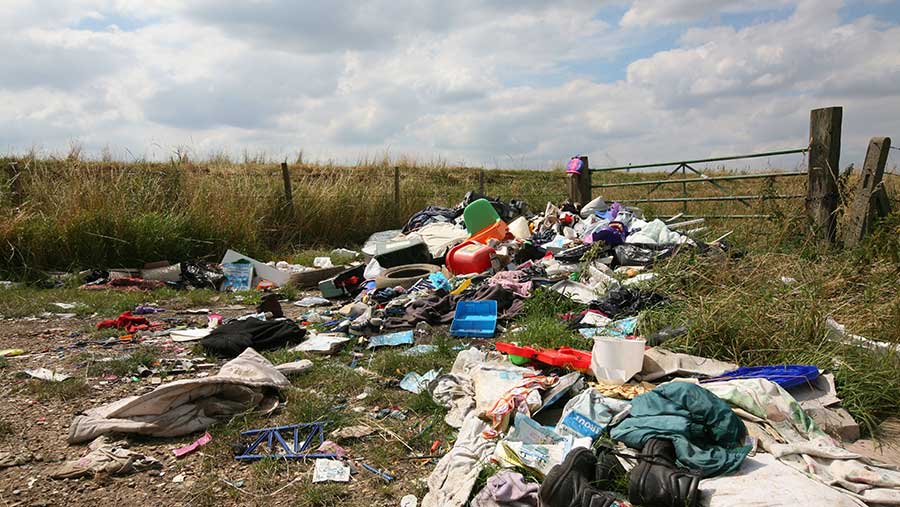New figures released this week (16th November 2023) by Welsh Government and Fly-tipping Action Wales (FtAW) reveal a 4% decrease in fly-tipping versus last year, as councils in Wales continue to crack down on the crime. Reported fly-tips fell to 39,853compared to last year’s 41,333 incidents.
The report also reveals that Rhondda Cynon Taf, Newport and Cardiff were among the councils achieving the highest number of successful fly-tipping prosecutions in Wales; while the highest-performing councils for issuing fixed penalty notices (FPNs) — fines to those whose waste was found to be fly-tipped — were Cardiff, Carmarthenshire, and Blaenau Gwent.
These actions are taken to enforce the law and deter fly-tippers — fixed penalty notices are issued for smaller scale environmental crime such as littering, smaller-scale fly-tipping and failure to check someone has a licence when removing their waste. Meanwhile, prosecution is used to penalise those responsible for large-scale fly-tipping, repeat fly-tipping offences, commercial fly-tipping or the fly-tipping of hazardous waste.
The 2022-23 report, which analyses fly-tips recorded by councils between 1 April 2022 and 31 March 2023, also revealed that a total of 27,373 waste enforcement actions (warning letters, fixed penalty notices, formal cautions and prosecutions) were actioned in Wales. There were 59 successful prosecutions in this year’s figures, a reduction on last year’s 91. However, last year’s figure included a number of delayed cases being heard as a result of the coronavirus pandemic. Encouragingly, councils have increased their use of fixed penalty notices for fly-tipping from 906 in 2021-22 to 1129 this year.
Although there is a slight decrease in fly-tips, householders should be aware as Wales continues to see huge numbers of online scammers, often dubbed ‘Facebook fly-tippers’, posing as legitimate waste removers in online communities, taking advantage of unsuspecting householders and illegally dumping their waste.

Fly-tipping clear-ups cost the Welsh taxpayer an estimated £1.83 million between 2022 and 2023 with household waste making up 70% of fly-tips. However, this figure could be dramatically decreased if all householders follow their waste Duty of Care, this involves ensuring they hire only registered waste carriers to take their waste away.
Welsh residents can support their local council and help to continue the downwards trend by always checking the person who removes waste from their home has a licence, waste carrier licences can be checked via naturalresources.wales/CheckWasteLicence or call 0300 065 3000.
Neil Harrison, Team Leader for Fly-tipping Action Wales, said: “Councils across Wales are working tirelessly to crack down on fly-tipping and to deter the criminals who are spoiling our landscape. It is really positive to see their ongoing efforts reflected in the overall decrease in fly-tipping across Wales in this year’s figures.
“It remains the case that around 70% of all fly-tips contain waste from households, which is why we are urging residents to protect themselves from unregistered illegal waste carriers and asking them to always check with Natural Resources Wales that the person they use to remove any excess waste from their home is a registered waste carrier”.
“The rise of social media has brought with it an increase in illegal fly-tippers, posing as legitimate waste removers in online groups — so, it is more important than ever that householders are vigilant in following their Household waste Duty of Care when paying someone to remove their waste.”
Cardiff Councillor, Caro Wild, said: Our objective is to prevent and detect fly tipping and we have invested in more CCTV this year. The enforcement teams continue to tackle offenders who fly tip and blight our environment through fixed penalty notices and prosecutions. With the use of CCTV in hotspot locations our aim is to prosecute offenders who continue to dump illegally’.
Fly-tipping is a serious crime. It causes considerable damage to the environment, the economy and local communities — householders who don’t check for a licence face a fixed penalty of £300 or a fine up to £5,000 and a criminal record if taken to a Magistrates Court. The person found guilty of fly-tipping the waste can receive an unlimited fine and up to five years in prison.
When arranging the removal of household waste, people in Wales are required to check with Natural Resources Wales that the person or company they are using are a registered waste carrier by visiting naturalresources.wales/CheckWasteLicence or calling 03000 653000.















